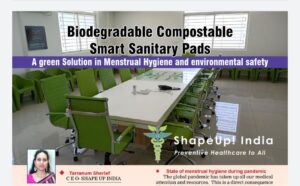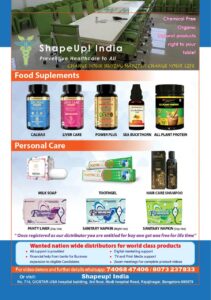Biodegradable compostable smart sanitary pads can be considered as a green Solution in menstrual hygiene and environmental safety. Adoption of sanitary napkins is less than 20% in the country. Disposing of used sanitary pads is another headache as most of its layers apart from, being non-biodegradable, they come under the category of serious biomedical waste.


Menstrual hygiene is still not considered a priority in India. The lack of menstrual hygiene has always been a challenge in India. According to UNESCO, 23 Million girls drop out of school due to lack of menstrual hygiene and awareness. For the longest time, the Indian society has treated menstruation as a taboo. The word ‘Period’ is usually uttered in hushed voices and years of social conditioning have built a culture of silence around what is a normal biological and physiological phenomenon.
Menstrual hygiene – a challenge in India.
With young girls and women having limited access to menstrual education and basic sanitary care products, the concept of menstrual hygiene has also remained a challenge in India. It is more difficult to manage menstruation without shame and discomfort in houses with limited spaces. In rural India, the unavailability of sanitary napkins coupled with unhygienic and crowded washrooms and toilets in their localities have worsened the situation for women.
The lack of menstrual hygiene education in India is also impacting girl’s education in a big way. These unprecedented pandemic times have made it even more difficult to keep girls in school. The premature closure of schools due to the pandemic affected access to education, especially for girls from marginalized communities. This has made them even more vulnerable to dropping out of school completely. Many of these girls would receive pads for period management from school which stopped, leading to them using unhygienic period protection.
State of menstrual hygiene during pandemic
The global pandemic has taken up all our medical attention and resources. This is a direct consequence of social stigma, lack of awareness and poor access to menstrual products. It is discovered that many of them prioritize beauty products but are not ready to spend a fraction of the amount on an essential like sanitary pads. Adoption of sanitary napkins is less than 20% in the country whereas adoption of cosmetics like lipstick is significantly higher at 65%. In addition, there is still a social stigma associated with periods.
As per UNESCO’s studies, about 71% of adolescent girls in India remain unaware of menstruation until they get their first period, adversely affecting their confidence and self-esteem. We see this as a pivotal movement to attain 100% menstrual hygiene In India. 30 years ago, less than 1 crore women used hygienic sanitary protection during their period. This number raised significantly due to marketing, wide coverage by media and enhanced trends of consumerism. While there has been a sea of change in normalising the conversation around periods, there is still so much more road to cover.
Menstrual Hygiene scheme (MHS):
The Ministry of Health and Family Welfare has introduced a scheme for promotion of menstrual hygiene among adolescent girls in the age group of 10-19 year in rural areas. The government is selling biodegradable and affordable sanitary pads to women.
The major objectives of the scheme are:
- To increase awareness among adolescent girls on menstrual hygiene
- To increase access to and use of high quality sanitary napkins to adolescent girls in rural areas.
- To ensure safe disposal of Sanitary Napkins in an environmentally friendly manner.
Indian school students making reusable sanitary napkins
Menstrual health in India needs more than just distribution of low cost sanitary pads. PM Narendra Modi is the first prime minister to address menstrual health as a public health issue. Could this lead to a renewed focus on an aspect of public health that has long been neglected and stigmatized?
Experts feel that the pandemic which affected commercial supply chains along with the continued closure of schools. When most adolescent girls have improvements in menstrual health, as more girls and women were left with no choice and had to resort to using old waste cotton cloth. Some of the core issues, however, existed before the pandemic. The National Family Health Survey (2015-16) found that usage of pads had gone up substantially. There is a greater need for better information on many fronts.
Improving the reach and quality of low cost pads


Menstrual health in India is still largely governed by taboos and a lack of information. There is little knowledge about the health consequences of using unhygienic methods for menstrual management. Though there has been a marked improvement in awareness, improving the reach and quality of low cost pads is an important part of tackling menstrual health, as affordability is still the main barrier for the usage of pads in India.
A report by the National Institute of Public Cooperation and Child Development, funded by ICMR, found that the awareness of adolescent girls about menstruation till its onset had gone up from 29.4% to 72.6 % in 2012. There are no recent figures available. The ICMR is currently conducting a study to find cost-effective menstrual hygiene solutions like the use of biodegradable sanitary napkins.
The culture of silence around menstruation in India has become more evident during the pandemic, as Yasmin Ali Haque, UNICEF representative in India said in a statement on Menstrual Hygiene Day in May. Menstrual health is to be seen as a part of public health and not just as women’s issue.
Problem of disposing of used sanitary pads:
More young Indians are adopting safer menstrual practices, but commercial brands with synthetic materials which pose health issues and environmental hazard that remains unaddressed. Disposing of used sanitary pads is another headache as most of its layers apart from, being non-biodegradable, they come under the category of serious biomedical waste. Sanitary pads proved as nut, hard to crack by pollution control board.
What makes the problem more complex is that menstrual health is not only a big hygiene issue, but also an equally acute environmental issue, because of synthetic materials in them. 336 million menstruating women use commercially produced disposable sanitary napkins. The study says that disposable sanitary pads may take over 500 years to decompose, posing a big environmental challenge.
Disposable sanitary napkins are a hazard because 70-90% of a sanitary pad is made of plastic. One pad is equivalent to four plastic bags.So one can imagine the quantity of single-use non-biodegradable plastic generated every month from sanitary napkins used by 336 million menstruating women. It’s a strong enough issue to raise environmental concerns by anyone.
Growing sanitary pad usage & its market size
The latest government data show that adoption of sanitary pads is growing steadily among the 15-24 age group. In 2020, the Indian sanitary napkin market touched USD 521.5 million and is expected to reach USD 975.4 million by 2026, according to Expert Market Research, an US-based market research firm. Sanitary pads are now widely available, but are we meeting this greater availability with appropriate waste management solutions that do not harm users and the environment?” says Arundati Muralidharan, policy manager at WaterAid India and author of 2018 report on menstrual waste.
Comfort and the pain points
Initially, sanitary napkins were made of cotton and gauze. But to opt for a more cost-effective raw material, manufacturers turned to cheaper absorbent material. Then came the plastic revolution, which changed sanitary napkins’ composition – which is comfortable but not healthy, according to Pooja Katkar, assistant professor at DKTE’s Textile and Engineering Institute in Maharashtra.
Now, the top permeable layer of the sanitary napkin is made of polypropylene or polyethylene. Inside fluffy are made of Super Absorbent Polymer (SAP) and the bottom barrier layer is made of polyethylene. These components are completely non-biodegradable, and bad for women’s health, according to Delhi-based Gynaecologist Meenakshi Sahu.
Plastic in sanitary pads disturbs vaginal microflora balance and can cause health problems including urinary tract infection, rashes and genital tract infection. In addition because of synthetic inner layer many women suffer itching, irritation and discolouration in inner thighs. Some studies indicate towards rising number of PCOD and infertility cases. Because of the heat generated dioxin, carcinogenic chemical leads to cervical cancer too.
Policy gaps
While the sanitary pad waste is a practical and measurable problem, policies remain vague. India’s pollution watchdog the Central Pollution Control Board (CPCD) mandated that soiled napkins as well as other sanitary products should be separated into biodegradable and non-biodegradable components. The Bio Medical Waste Management Rules 2016 indicate that items contaminated with blood and body fluids, including cotton, dressings, soiled plaster casts, lines and bedding, are bio-medical waste and should be incinerated, autoclaved or microwaved to destroy pathogens. However, environmental experts and studies argue that when these pads are burned in the open or in incinerators, they release toxic chemicals such as furans, a highly volatile chemical compound, and dioxins that are known carcinogens.


Any alternate to these burning issues?
Commercial napkin brands, add to the problem, by not disclosing the product composition on the package as there is “no mandatory rule in India to mention the composition of their products on the packets. Amid growing apprehension about sanitary pads SHAPEUP INDIA- a renowned preventive health care organisation is now offering a natural, fully absorbent made of cotton material, comfortable, biodegradable and compostable international standard SMART SANITARY PADS in Indian Market at very much affordable prices through Social marketing.
In addition they provide FREE VAGINAL TEST KIT, which costs in the market around Rs175. This helps woman to test their vaginal health as a preventive measure. Unique feature is all pads have got Active oxygen, Anion, Far Infrared rays, Magnetic and Nano silver Chip. This takes care of all the problems women are facing while using presently available pads in the market.
A 2020 study found that some 63% of Indian women surveyed and recognise that sanitary pads are harmful for women’s health and environment 80% of them expressed willingness to shift to eco-friendly substitutes. Adoption of eco-friendly alternatives is a welcome move and we do see the shift happening across verticals of users,” said Smt Hemalatha S Murthy, founder SHAPEUP INDIA , a social enterprise formed by a group of Expert Doctors and Health care professionals promoting preventive Healthcare at Community and Corporate levels.
(Information Source: W H O, UNESCO, Business India)
FOR pad demo videos Whatsapp: 7406 84 7406/ 8073237833
Send mail to contact@shapeupindia.in


Tarranum Sherief
C E O- SHAPE UP INDIA
I think this is a brilliant innovative milestone from SHAPEUP INDIA that could be futuristic intervention not only for India but globally. Menstrual pads are a real public health problem and any solution to circumvent this is welcomed. The big commercial giants might not welcome this great move but on the long term this could be a sustainable solution which could also add to best hygiene practices and environmental intervention.
Agreed! In India there is no sustainable route for disposal of single-use menstrual or incontinence products. Biodegradable and Compostable pads would revolutionize waste management. CBPC Authorities will need to organize large-scale composting for high-density populations.


Dr Srinivasamurthy D
Consultant- Preventive Health care & Regenerative Medicine
Medical Director –GIOSTAR USA (Bangalore branch}











